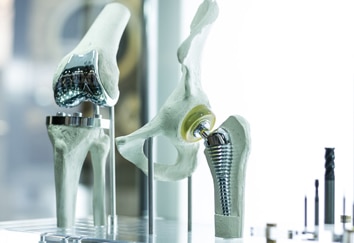Joint replacement is a routinely performed surgery, but just as other surgeries it also carries its share of risks. Such risks lead to medical malpractice, and processes such as medical record retrieval, review, and eventually medical litigation that can be quite distressing to physicians. Joint replacement surgery or arthroplasty involves removing the damaged cartilage from both sides of a joint and resurfacing the joint with a replacement implant. This implant is designed to work like a normal joint, and is expected to enable patients to resume a high degree of normal activity within a few months. For many people, joint replacement surgery opens up a whole new life that is pain free and independent with restored daily function. Every year, over a million joint replacement surgeries are performed. However, many joint replacements fail and result in medical malpractice litigation. Surgical complications are sometimes unavoidable though some are the result of the surgeon’s negligence.
Becker’s Healthcare refers to an article in the Journal of Arthroplasty that cites the main cause of medical litigation as infection resulting from total joint replacements, at least in one metropolitan area in the United States. The study authors conducted a retrospective review of lawsuits filed from 2009 to 2015 in a five-county area with 30 hospitals and 113 surgeons who perform total joint replacements. The study found that:
- Among the 113 total joint replacement surgeons in the area, 27.4% had been named a defendant in a lawsuit, and 83 lawsuits were filed during the 6-year investigation period.
- The most common reasons for litigation, ranked in descending order from the most common were:
- Infection
- Nerve injury
- Chronic pain
- Vascular injury
- Periprosthetic fracture
- Foreign body retention
- Dislocation
- Limb-length discrepancy
- Venous thromboembolism
- Loosening
- Compartment syndrome
- Half of the lawsuits were either dismissed or settled.
The authors of the study suggest that surgeons should work towards better communication with their patients regarding the possibility of infections during pre-operative discussions and education, as well as disclosures after adverse events. Surgeons should minimize performing surgery in patients at high risk of complications such as patients with higher likelihood of developing post-operative infection or patients taking chronic pain medications.
Now, patients are realizing that their replacement implants could wear out and they may have to replace it many times. Record Searchlight carried a story on this last year. This story cites statistics provided by the Millennium Research Group that found that in 2015, 522,300 people had hip replacement surgery, while 815,400 had knee procedures. This trend is probably because of the fact that joint replacement technology and surgeries have become more sophisticated. The American Academy of Orthopedic Surgeons says that by 2030, around 3.5 million people will be getting total knee replacement surgeries a year. However, going by the many recent reports, these new joints may not last permanently. The plastic could wear out, the parts may malfunction or infection may set in, and all this could necessitate another surgery. Subsequent surgeries to put in a new joint or repair the damaged joint could be more complex than the first one. Moreover, recovery time is also longer for ensuing surgeries. When a patient typically recovers in a month or two from an initial surgery, he/she may require three months or more to recover from a later one.
According to Dr. Troy Miles, an orthopedic joint replacement surgeon in Redding, the reasons why patients may need multiple joint replacements vary. Body weight plays a major role in a patient’s surgery outcome and revision risk. He says that the heavier the person, the more stress on the joint; he usually requires patients considering joint replacement surgery to have a BMI below 40. He does not operate on patients with uncontrolled diabetes, and those who smoke, both of which are risk factors. He emphasizes that patients should take care of themselves during recovery to ensure a successful joint replacement. Dr. Miles also suggests the following.
- It is expected that the joint will never be the same for certain indications such as infection around the replaced joint.
- For indications such as a loose implant or worn-out plastic component, patients can expect reasonable improvement on their earlier situation provided the revision surgery goes smoothly.
- During the recovery period, patients should follow all the instructions and recommendations of their surgeon. They should be careful about the replaced joint as well as their overall health.
- Even a dental infection or cut could become a major issue if it spreads to the replaced joint.
- Patients should have regular check-ups and consult their surgeon at the 10-year mark to ensure that the implants are not worn out.
A joint replacement surgery that didn’t go well doesn’t automatically lead to a medical malpractice case. Medical malpractice occurs when the surgeon or other medical professional fails to observe the standard of care in their field, under the circumstances. In many cases, surgeons typically warn their patients of the risks involved before the surgery. The informed consent given by the patient protects the surgeon from malpractice liability. If there is a lack of informed consent, which shows the patient was not probably warned of the risks, the surgeon may be at risk of medical malpractice. Another important thing is medical necessity – surgeons should recommend a joint replacement procedure only if it is medically necessary for the patient. Otherwise, apart from the risk of medical error, the medical claim for the procedure may also be denied following a medical claims review.




